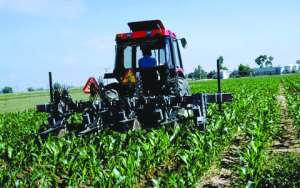The National Genebank CSIR-PGRRI;A Critical Investment for Ghana's Agriculture Sector

The national genebank, the Council for Scientific and Industrial Research-Plant Genetic Resources Research Institute (CSIR-PGRRI), was set up as a strategic investment for the agricultural sector in Ghana. As the national genebank, the CSIR-PGRRI is mandated to collect and conserve the plant genetic resources (PGR) of Ghana and to coordinate all PGR activities in the country. Plant genetic resources are the sum total of all hereditary material in a single (interbreeding) plant species containing useful characters of actual or potential value. They are the basic raw materials for crop improvement.
With a unique and diverse collection of over 6,000 accessions of crop wild relatives, improved varieties in current use and landraces that are crucial to promoting food security, agriculture, and biodiversity conservation in the country, the genebank should be a top priority for the government of Ghana. Plant breeders for instance, can use the genetic diversity of these plant resources to develop new crop varieties that are better adapted to local growing conditions, resistant to pests and diseases, and with improved nutritional quality, thereby improving food security in the country. This aligns with the Sustainable Development Goal (SDG) 2 - Zero Hunger.
The CSIR-PGRRI also has regional significance beyond Ghana, as it is an essential partner in regional and global initiatives that aim to conserve and use plant genetic resources sustainably. The CSIR-PGRRI is one of a few multi-crop genebanks globally. The genetic resources conserved at this genebank can be shared with other countries in the West African sub-region, promoting regional cooperation and collaboration in plant breeding and research. This aligns with SDG 17 - Partnerships for the Goals.
Ghana's genetic resources are under threat from factors such as climate change, deforestation, and urbanization. The maintenance of the CSIR-PGRRI is critical for the conservation of Ghana's genetic resources, ensuring that they are available for use now and in the future. Developing crop varieties that are more resilient to climate change can help Ghana to mitigate the impact of climate change on the agricultural sector. This aligns with SDG 13 - Climate Action.
Furthermore, the genetic resources conserved at the national genebank are essential for maintaining the country's biodiversity and supporting sustainable agriculture. Improved agricultural productivity resulting from the use of genetic resources stored at the national genebank can help reduce poverty in rural areas by increasing farmers' incomes. This aligns with SDG 1 - No Poverty.
Investing in the national genebank can also help to improve gender equality in the agricultural sector by providing women farmers with access to improved crop varieties and other plant genetic resources that are better adapted to marginal lands, which most often, women farmers and other disadvantaged segments of the population cultivate their crops on. This aligns with SDG 5 - Gender Equality.
In addition to the above, the plant genetic resources conserved at the national genebank are essential for research and development in various fields, including agriculture, biotechnology, and medicine. Researchers can use these resources to develop new technologies and products, which can create new industries and enhance economic growth.
Therefore, the government of Ghana must prioritize the maintenance of the CSIR-PGRRI by providing sufficient funding and requisite infrastructure to ensure that the genebank is properly resourced to fulfil its mandate of ensuring the long term sustainable onservation of the plant genetic resources of Ghana for use by researchers, plant breeders, and farmers. This will contribute to achieving multiple SDGs. Thus, investing in the national genebank should be considered as a strategic priority by the government of Ghana.
The writers are Researchers with the National Genebank, the CSIR-PGRRI, located at Bunso, Eastern Region, Ghana.
The CSIR-PGRRI has the mandate to collect, characterize, evaluate, document, conserve, distribute and utilize plant genetic resources (PGR) from Ghana and abroad. Our goal is to ensure the effective conservation and use of PGR for food security and sustainable agricultural development.
